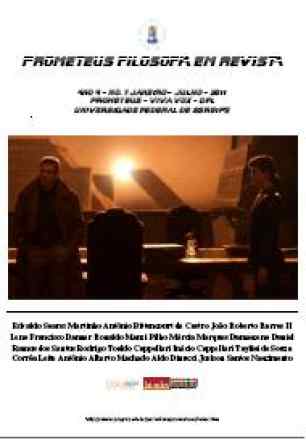DA REPRESENTAÇÃO AO CONCEITO: UM ESTUDO SOBRE A LINGUAGEM NO TRÂNSITO DA FENOMENOLOGIA À LÓGICA DE HEGEL
Prometeus Filosofia Em Revista
DA REPRESENTAÇÃO AO CONCEITO: UM ESTUDO SOBRE A LINGUAGEM NO TRÂNSITO DA FENOMENOLOGIA À LÓGICA DE HEGEL
Autor Correspondente: Vânia L. F. Cossetin | [email protected]
Palavras-chave: Hegel, Linguagem, Representação, Conceito.
Resumos Cadastrados
Resumo Português:
Ao término da Fenomenologia do espÃrito, a consciência teria encontrado a
concordância entre a lógica do seu saber e a do objeto e, supostamente, superado o traço
representativo ao qual estava condicionada. Essa seria a condição para a introdução na Ciência
da Lógica que não comporta uma teoria da referência, do significado, em que ser e pensamento,
sujeito e objeto não encontram conciliação. Ou seja, é no nÃvel autofundante e lógico do
pensamento puro que o EspÃrito atingiria seu desenvolvimento pleno, no seio mesmo do
universal e não em meio à reflexão subjetiva de uma consciência individual cuja linguagem é
ainda instrumental. Diante disso, o presente texto procura responder duas perguntas em ligação:
como se dá a passagem da linguagem representativa da Fenomenologia à linguagem conceitual
da Lógica, a qual teria ocorrido sem o sacrifÃcio da fluidez orgânica do sistema ou uma ruptura
radical no seu desenvolvimento, isto é, sem o abandono de uma linguagem ainda finita e
contingente para adoção de uma inteiramente nova, pura e incondicionada? E qual o papel
assumido por Hegel nesse trânsito, enquanto sujeito finito e ao mesmo tempo veiculador da
Razão Absoluta sem o qual a verdade lógica jamais ganharia objetividade?
Resumo Inglês:
At the end of Phenomenology of the spirit, consciousness would have met the
agreement between the logic of its knowledge and the object’s and, supposedly, overcome the
representative trace to which it was conditioned. This would be the condition to the introduction
in Science of Logic which does not allow a theory of reference, of meaning, in which being and
thought, subject and object do not find conciliation. That is, it is in the self founding and logic
level of the pure thought in which the Spirit would reach full development, in the center of the
universal and not through subjective reflection of an individual awareness whose language is
still instrumental. Facing that, the present text tries to answer two linked questions: how does
the passing of representative language of Phenomenology happen to conceptual language of
Logic, which would have occurred without the sacrifice of organic fluidity of the system or a
radical break in its development? And what is the role played by Hegel in this process, while
finite subject and at the same time conductor of Absolute Reasoning considering that with him,
the logic truth would never have objectivity?

